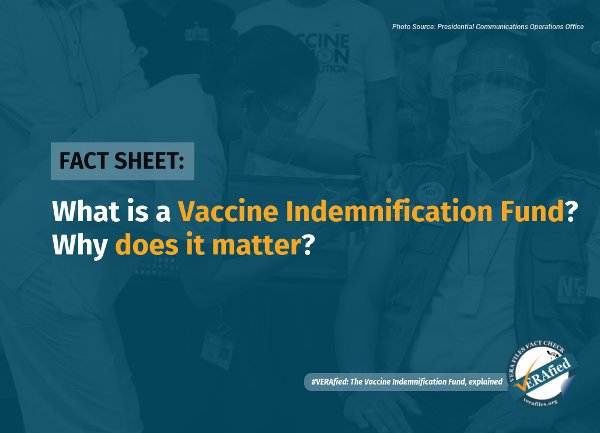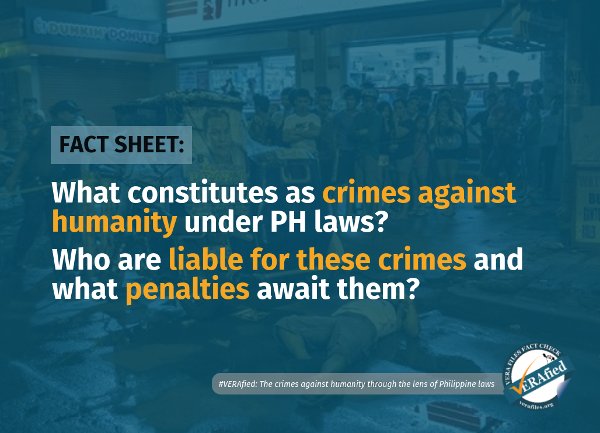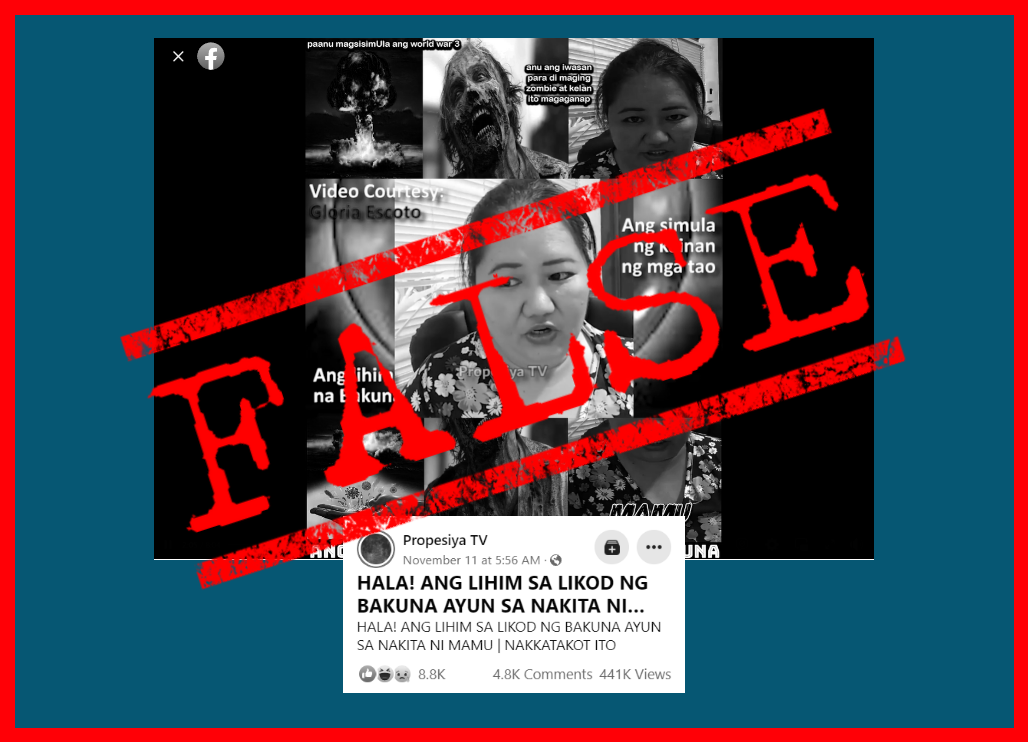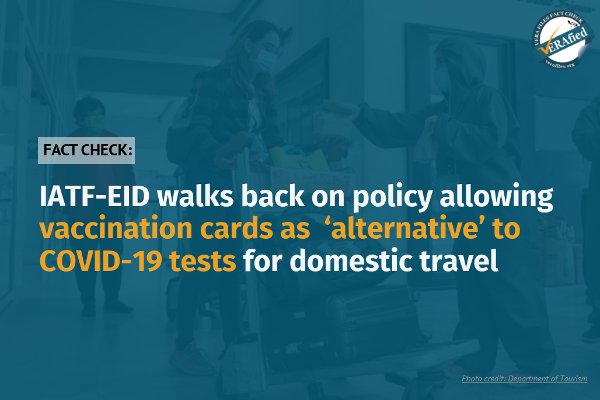This article was updated to correct the current affiliation of Dr. Melvin Sanicas. The earlier version of the story stated his previous affiliation with Takeda Vaccines, Inc.
In defending the rights of individuals who choose not to get the jab against the coronavirus disease 2019 (COVID-19), Public Attorneys Office (PAO) Chief Persida Acosta erroneously claimed that those who are vaccinated “do not have immunity” against the virus and, therefore, are not different from those who are unvaccinated.
Acosta also insinuated that it is possible for the virus to come alive in the body after vaccination. This incorrect claim has been repeatedly debunked by health experts around the world.
STATEMENT
In a Jan. 21 exclusive interview with the group Concerned Doctors and Citizens of the Philippines (CDCph), lawyer Acosta said:
“‘Yung mga nasaksakan ng COVID vaccine … walang immunity sa COVID. Mako-COVID ka … Imagine, nagpabakuna ka, magkaka-COVID ka rin pala, e ‘di pareho lang nung unvaccinated. Nagkaka-COVID din ‘yung vaccinated, nagkaka-COVID din ‘yung unvaccinated.
Ta’s sasabihin ni Sen. [Franklin] Drilon, delikado raw ako, delikado mga empleyado sa ’kin dahil wala akong bakuna. Bakit, anong pagkakaiba ko sa bakunado?”
(Those who were injected with the COVID vaccine … have no immunity from COVID. You will still get COVID … Imagine, you get vaccinated and yet, you end up getting COVID. So, it’s just the same with being unvaccinated. Those who get vaccinated get COVID, the unvaccinated also get COVID.
Then Sen. Drilon says I am dangerous, that employees are in danger because I am not vaccinated. Why, how do I differ from those vaccinated?)
Source: GMN TV3 Facebook Page, CDCph Live EXCLUSIVE Interview with PAO Chief Atty Persida Acosta, Jan. 21, 2022, watch from 14:05 – 15:01
Acosta then said she was “better off” than those vaccinated because her antigen and RT-PCR tests were negative and that she had “no symptoms,” adding:
“E ‘yung bakunado? May COVID virus ‘yun na in-inject, nasa katawan niya. Sabihin mo nang dead, e pa’no kung biglang mabuhay sa katawan mo, mag-positive ka nga. ‘Yun po ‘yun, e.”
(But the vaccinated? [They were] injected with the COVID virus, it’s in the body already. Even if you say [the virus is] dead, what if it suddenly comes back to life inside your body and you become positive? That’s the thing.)
Source: watch from 15:01 – 15:18
The video was uploaded by Facebook (FB) page Gising Maharlika Nation (GMN) TV3 and reached over 13,000 views as of publication. It also appeared in at least 24 other pages and groups, based on social media monitoring tool CrowdTangle.
FACT
Vaccinated individuals do develop immunity against the COVID-19 virus. This protection, however, is not perfect, as with other health interventions, according to the World Health Organization (WHO).
“[There will still be] a few that will get the disease even if they were vaccinated just because it will not work 100% for everyone. But it does work for the great majority of people and it protects them from severe illness and death,” said former Food and Drug Administration (FDA) director-general Eric Domingo in a media forum in September last year.
Several factors may affect the level of protection from COVID-19 vaccination. These include the weaker immune system of certain populations like the elderly and people with chronic medical conditions, one’s level of exposure to the virus, the time lapsed since vaccination, and the emergence of new variants.
(Read VERA FILES FACT SHEET: Why fully vaccinated people still get infected with COVID-19)
Although protection from vaccine-generated antibodies wanes, it does not mean that the body’s immune defenses have disappeared completely, said a team of health experts convened by global technology nonprofit Meedan. Antibodies are proteins that help prevent specific infections.
Another component of the immune system called T-cells — which can be generated both from vaccination and a natural infection — “do not fade as quickly as antibodies,” Dr. Melvin Sanicas, vaccine expert and senior medical director at Clover Biopharmaceuticals, said in an email to VERA Files Fact Check.
He explained that T-cells can “help clear the infection and prevent severe disease” because of its ability to kill virus-infected cells and recognize more sites along the spike protein, which is the part of the COVID-19 virus that attaches to human cells.
While there is immunity from natural infection, Sanicas noted that “vaccination induces a more robust immune response in a safe and controlled way.”
“Immunity from the virus is very inconsistent and varies a lot from [person] to [person] because you cannot control the viral dose. While immunity from vaccination is more consistent because the amount of antigen given to people is the same,” he said.
Given the recent threat of the Omicron variant, Meedan’s health experts cautioned that the increase in COVID-19 infections among vaccinated people “is being falsely misinterpreted as evidence that those who have gotten their shots are more likely to get infected than those who have not.”
On Jan. 25, the Department of Health (DOH) confirmed that Omicron is now the predominant variant in the Philippines. Some preliminary research indicates that Omicron appears to be more transmissible than Delta. (See VERA FILES FACT SHEET: When will the COVID-19 pandemic end?)
Here’s what is known about the difference between the vaccinated and unvaccinated against COVID-19 based on currently available evidence:
| On the risk of getting infected | Overall, scientists say people who are vaccinated are “less likely” to test positive for COVID-19 regardless of the variant, compared to people who are unvaccinated.
As of Jan. 23, the Philippine FDA reported only 3,033 confirmed COVID-19 infections, including 203 “severe cases that resulted [in] a fatal outcome,” from among more than 123.37 million vaccine doses administered. The agency said most of the fatal cases have “not yet completed vaccination course,” and that the deaths were “not related to the use of the vaccine, but … were actual COVID-19 natural infections.” Other health authorities also pointed out that even if vaccinated people get reinfected, the symptoms “tend to be less severe” than in those unvaccinated. The population most at risk for reinfection are those with a weakened immune system caused by some medical conditions or treatments. Hence, the DOH Health Technology Assessment Council (HTAC) has recommended booster shots, citing the need for “sustained protection against COVID-19 among high risk populations,” especially for healthcare workers and the elderly. |
| On the risk of passing on the virus | Recent studies have shown that fully immunized persons transmit the virus less than those who are partially vaccinated and unvaccinated.
But Meedan’s global team of health experts has said the exact rate of transmission among the vaccinated remains uncertain. It said “more research is needed about the relationship between transmission of COVID-19 and the current vaccines in order to understand how vaccination affects transmission in the long run.” |
| On the risk of getting hospitalized and dying | In a Dec. 1, 2021 explainer, Meedan’s experts said “the majority of research supports the safety of the vaccines and their benefit in reducing deaths from COVID-19 infection.” It cited studies from the United States, France, and Israel.
Scientists from the United Kingdom (U.K.) wrote in an article, published in October 2021 in The New England Journal of Medicine, that the Pfizer-BioNTech vaccine was 90% effective against death two weeks after the second dose. AstraZeneca, on the other hand, yielded 91% effectiveness. The authors examined data from 114,706 adults in Scotland who were infected mostly with the Delta variant. Locally, 85% of COVID-19 cases admitted in the intensive care unit (ICU) are unvaccinated, based on data collected by the DOH from 18 Metro Manila hospitals as of Dec. 28, 2021. VERA Files Fact Check requested for updated data but this has yet to be provided as of publication. |
Sanicas emphasized that, “Individuals who are vaccinated are much less likely to be infected therefore much less likely to spread the virus and even if they become infected, they clear the virus faster and they are protected from serious illness, hospitalisation, or death.”
As of Feb. 1, more than 59.12 million Filipinos are fully vaccinated, while more than 7.57 million have received their booster doses, according to data from DOH.
Health authorities continue to remind the public that it is still important to observe public health safety standards such as masking, physical distancing, and maintaining proper ventilation to be protected from the virus.
BACKSTORY
In a Jan. 17 interview on ANC Headstart, Acosta said she has not been vaccinated, citing her age and “health considerations,” and adding that “I cannot face a vaccine now, which will make you sick.”
Acosta expressed dismay over the government’s “No vaccine, no ride” policy, which she described as “unconstitutional.”
In a statement four days later, Drilon urged President Rodrigo Duterte to persuade every government official, including Acosta, to get inoculated to convince the public that “the vaccine that he (Duterte) is giving to millions of Filipinos is safe and necessary in order for us to overcome the COVID-19 pandemic.”
“Otherwise, the credibility of your vaccination programs will suffer and people will be more reluctant to get the shots,” Drilon added.
Editor’s note: This article was updated to correct the current affiliation of Dr. Melvin Sanicas. The earlier version of the story stated his previous affiliation with Takeda Vaccines, Inc.





